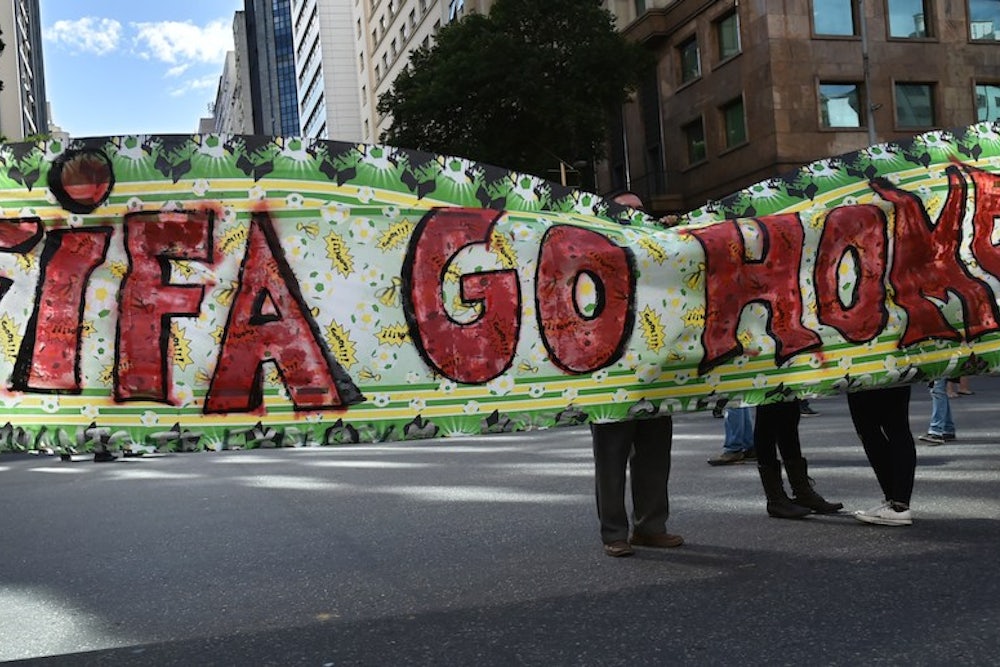This is the World Cup of dissonance.
What, exactly, happened yesterday? A day years, even decades, in preparation, meant to be an joyful invocation, an invitation to the world, and a crowning for Brazil's state and Brazil's team, instead made abundantly clear how fragile this tournament might turn out to be.
In a stadium built at the cost of millions of dollars and three lives, many seats were empty as we watched the surreal opening ceremony. On Twitter Teju Cole likened it to a "kindergarten variety show," and David Goldblatt noted, among its varied characters, the "cheap rate ents." The one truly moving and extraordinary moment—the unveiling of a robotic exoskeleton allowing a paraplegic man to walk, and kick a ball—slid by too quickly, when it should have been the centerpiece. (I won't even begin to discuss the song performance, nor Pitbull's white pants).
The stands were partly empty because, outside, the massive security apparatus put in place to guarantee the undisturbed unfolding of the event was doing essentially the opposite, responding to a tiny protest with relentless force. So that on Twitter the excited expressions of "it's finally here!" were interspersed with photos of journalists wounded by stun guns outside the stadium.
Jennifer Doyle has captured the deep ambiguity many of us are feeling around this event. I love the World Cup. I am among those who mark time in four year increments, not because of elections but because of this tournament. Today, I want to love the World Cup: to just enjoy the fact that one of my teams (you need a few if you want to make it through), Belgium, may shine this year. But I feel like this is a simulacrum of the World Cup: like the real thing, the thing we dream of, has basically vanished. Doyle outlines the reasons brilliantly: there is just too much cynicism, too much stolen, to make us feel like we can be at home in this.
There are glimpses of something else: of transcendence. One came yesterday when the Brazilian anthem was sung, carried by the crowd after the speakers had stopped playing it. That was a replay of sorts: it happened spontaneously last year at the final of the Confederations Cup. But it was no less riveting for that. And you could see the players—who have an incredible opportunity, but also an unenviable burden—were overcome, transported by the moment.
But joined around the anthem, the crowd was in no mood for political concession: President Dilma was insulted with mass chants, and booed when the screens showed her cheering for a goal.
Goals there were, too, but mostly very dislocated ones. Could Brazil have started off the tournament any worse than with an own goal just a few minutes in? Neymar (it almost seemed inevitable after the fact) equalized honorably, and for a while it seemed like it might be the kind of match warranted for the occasion. (Ian Darke, oddly, referred to Neymar a bit later as "the pinup boy," another off-kilter symptom.) Then the second half unrolled as if to provide the best possible fodder for those who thought something had been fixed. Oscar's goal was greeted with a kind of relief, as were a few other fragments of beautiful play. Football games are often strange and unsatisfying affairs, the 2010 final being one of the best examples. But this one, in the circumstances, was particularly unsettling. The stadium itself seemed to be making a statement, with a whole bank of lights going out for a time.
Most of all I left with a sense that almost anything can happen in the next weeks, both on the pitch and in the streets. What the fans in the stadium, what Dilma and Blatter, and frankly what many of us probably wanted yesterday, was confirmation, or at least consolation. After all that has happened, we wanted at least to see a gorgeous spectacle on the pitch. What we got was something else: a reminder, and perhaps a warning, that nothing of this World Cup has yet been written.
The World Cup of Dissonance
Yesterday's opener proves that we don't know what to expect from this World Cup.

Yasuyoshi Chiba/AFP/Getty Images